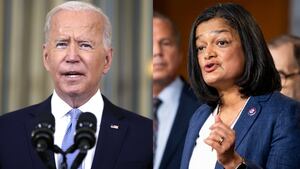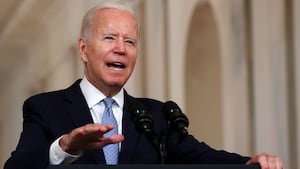With a critical vote looming on a pivotal part of President Joe Biden’s domestic agenda, it’s a put-up or shut-up moment for every faction of the Democratic Party, but one particular group especially: the Progressive Caucus.
In recent years, liberal Democrats have often found themselves swallowing much of their discontent as watered-down policies and compromises were the norm in a divided government. But with Democrats now fully in control of Washington, progressives finally seem poised to fight.
There are two bills Biden has said he wants to get done: a bipartisan $1 trillion infrastructure bill for things like roads and bridges, and a $3.5 trillion bill for social programs like childcare, elder care, climate change, and a host of other programs that Democrats would have to pass on their own through a special reconciliation process.
After the $1 trillion infrastructure bill passed the Senate in August, a small group of moderates in the House have been angling for ways to pass that bill and only that bill—the larger reconciliation package be damned. Progressives, realizing that this is the gambit, have sworn they will not support the infrastructure bill unless and until the $3.5 trillion package moves through Congress too.
On Thursday, progressives may finally get their chance to show moderates that they aren’t bluffing.
Speaker Nancy Pelosi (D-CA) has promised a vote on the infrastructure bill, and though that plan has been rapidly in flux for days, progressives will get a chance to demonstrate to moderates that it’s all or nothing—either both bills pass, or none of them do.
Pelosi could always pull the bill from the floor, knowing that there aren’t enough votes to pass it. But that, too, would still show moderates like Sens. Joe Manchin (D-WV) and Kyrsten Sinema (D-AZ) that they can’t have their infrastructure bill unless there’s an agreement on the larger package. It would achieve the same result as progressives actually voting down the bill.
The problem for moderates, however, is that they don’t think they’ll lose. Rep. Josh Gottheimer (D-N.J.), the de facto leader of a group pushing hard to pass the infrastructure deal, told POLITICO on Wednesday that they would be popping champagne after the vote.
Progressives, meanwhile, see the vote going very differently.
The chair of the Progressive Caucus, Rep. Pramila Jayapal (D-WA), has confidently said for days that the vote on Thursday will fail, and other liberals have backed up her claims.
“I definitely have a sense that the Progressive Caucus means business,” said Rep. Mark Takano (D-CA), a member of the caucus. “You do need credible threats to force people to talk. Tomorrow’s in that category of a credible threat.”
That progressives are making credible threats to begin with is yet another sign of changing political dynamics in the party. Typically, they have constituted a boisterous wing of the party, but one unable to effectively use its leverage to force their will in major legislative showdowns.
But now, progressives have greater numbers than ever in Congress, and in this fight, they can credibly claim they have the president behind them. Biden, after all, wants both bills, and has indicated he has blessed the two-track strategy of getting them to his desk.
Rep. Ilhan Omar (D-MN), the Progressive Caucus’ whip for several years, told The Daily Beast on Wednesday that she has “never seen a more unified caucus and a more focused caucus.”
“And if we, as unified as we are and as focused as we are, aren’t able to deliver this, it will have a significant impact on our members,” Omar said. “We have to stay in the game and work nonstop to make sure that we are victorious.”
Claiming the Biden mantle has many progressives feeling like they are more than justified in drawing a hard line. “I just feel like we're the closest to actually having the President's back and what he wants to get done,” said Rep. Mark Pocan (D-WI), a former Progressive Caucus co-chair. “We're just, you know, probably a little more willing to put some capital, some human capital, to get it done.”
While progressives and moderates are both confident they’ll prevail, many lawmakers in no particular ideological camp intend to vote in favor of the narrower bill because it’s a bill they support.
Rep. Emmanuel Cleaver (D-MO) told The Daily Beast he believes it’d be the “height of irresponsibility” to vote against the infrastructure legislation, and he urged Biden to come to Congress and make that case personally.
“If he can come over and paint a picture of what it’s like to have a stellar success, and success builds on success, maybe having it fall from the lips of the leader of the free world may be a lot more powerful than hearing it from the likes of myself and others,” said Cleaver.
Intraparty tensions reached perhaps their highest point yet on Wednesday, amid frantic meetings between the White House, leadership, and key holdouts. One of the holdouts, Manchin, took a position that, to many progressives, underscored their resolve to block the narrower infrastructure bill.
In a lengthy statement released Wednesday evening, Manchin said a $3.5 trillion bill—which Biden requested—would be the “definition of fiscal insanity” and suggested it would “reengineer the social and economic fabric of this nation,” both of which have been Republican talking points. (It should be noted that, while the bill colloquially is referred to as the $3.5 trillion bill, Democrats promise that they’ll offset the cost with revenue-raising policies, meaning it could actually cost $0.)
But if Manchin’s intention was to make the case for just the bipartisan bill, it had the opposite effect. Progressives already didn’t trust centrists like Manchin to advance the broader bill if they first passed the infrastructure measure. Now they know that’s exactly his gambit.
“After that statement we probably have even more people willing to vote no,” Jayapal told reporters, adding this dig at Manchin: “I assume he is saying that the president is insane, because this is the president’s agenda.”
In the House, some moderates fear that the tactics from progressives could turn off Manchin and Sinema altogether and scuttle negotiations, endangering the entire two planks of the package.
But progressives insist they want both bills, and view this strategy as the only way of getting both. If they follow through on their commitments of voting against the infrastructure bill, it’d be a blow to Biden’s agenda in the near term—and it’d feed into GOP narratives about Democrats in disarray—but progressives say it’s the only way to get both packages; they have to hold the infrastructure bill hostage until moderates relent.
Meanwhile, lawmakers are projecting optimism and a sense that the current legislative standoff is a real, but brief, challenge on the route to success.
“I don’t perceive that a failure tomorrow would ultimately be a failure for the president,” Takano said. “It’s definitely not a good look, it’s not a momentum-building moment, but punting might buy more time to get people to talk.”
For now, though, some can’t help but let their frustration at some of the people involved show through.
“I’m optimistic that this family dispute will be resolved,” Takano continued. “And it’s 96 percent of the family that’s basically aligned. It’s 4 percent of the family that, I don’t know, they’re kind of like that group that’s disputing the will or something.”











